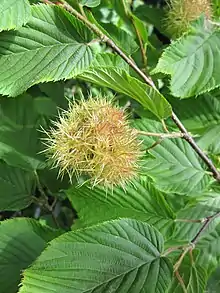| Himalayan hazelnut | |
|---|---|
 | |
| Scientific classification | |
| Kingdom: | Plantae |
| Clade: | Tracheophytes |
| Clade: | Angiosperms |
| Clade: | Eudicots |
| Clade: | Rosids |
| Order: | Fagales |
| Family: | Betulaceae |
| Genus: | Corylus |
| Species: | C. ferox |
| Binomial name | |
| Corylus ferox Wall. | |
Corylus ferox, the Himalayan hazelnut or Tibetan hazelnut, is a species of hazel native to the Himalayas of eastern Asia.[2]
Description
The Himalayan hazelnut is a deciduous tree growing to 32 m (105 ft) tall, with a monoecious leaf that can individually be male or female and some can be both sexes. The leaves are rounded or elliptic, 7–12 cm (2+3⁄4–4+3⁄4 in) long and 3–5 cm (1–2 in) broad, with a fine and sharply serrated margin and an often truncated apex. The flowers are wind-pollinated catkins and precocious. The male (pollen) catkins are pendulous with numerous solitary flowers and no perianth, while the female catkins are inconspicuous, 6-8 scaly buds and perianth adnate.[3]
References
Wikimedia Commons has media related to Corylus ferox.
- ↑ Roy, S.; Shaw, K.; Wilson, B.; Rivers, M.C.; Beech, E. & Barstow, M. (2018). "Corylus ferox". IUCN Red List of Threatened Species. 2018: e.T194458A2337394. Retrieved 23 January 2023.
- ↑ Corylus ferox - Wall. Plants for a Future. Accessed 21 February 2019
- ↑ Corylus ferox Wall. Bhutan Biodiversity Portal. Accessed 21 February 2019
This article is issued from Wikipedia. The text is licensed under Creative Commons - Attribution - Sharealike. Additional terms may apply for the media files.
